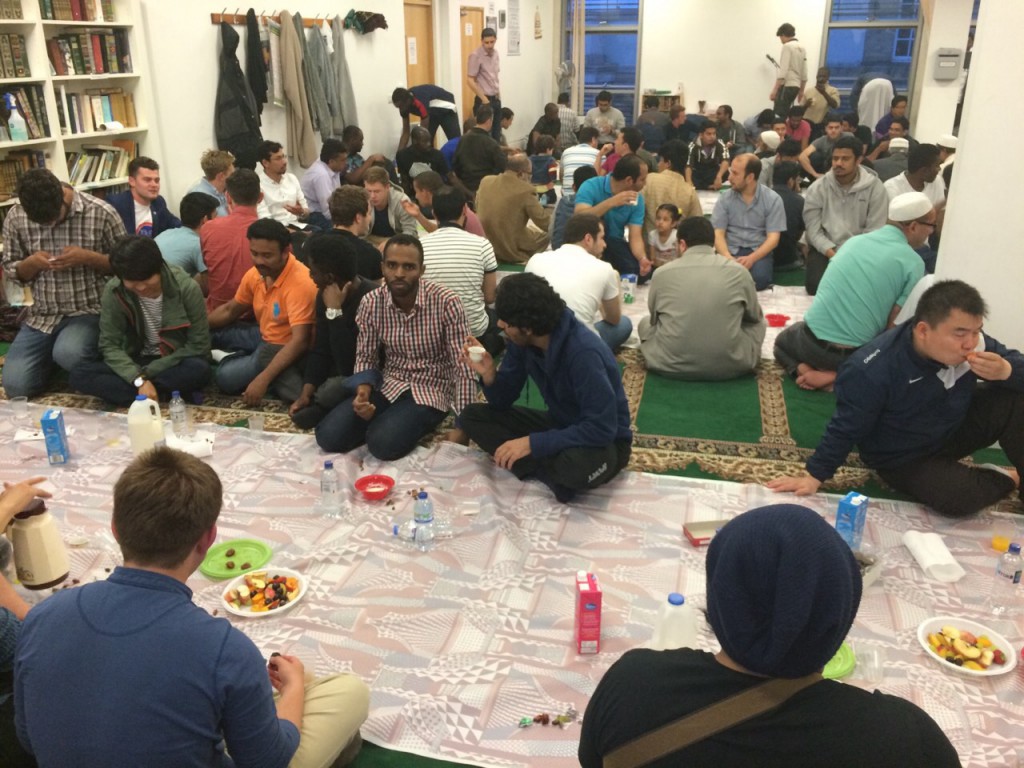July 17, 2015, by International students
Ramadan in Nottingham
Meredita Susanty, an international student from Indonesia studying MSc Management and Information Technology at The University of Nottingham.
This blog post was written in 2015. For dates of the Islamic Society’s current events, see the Islamic Society website.
Ramadan is the ninth month in the Islamic calendar, where any Moslem people who have hit puberty are meant to not consume any food or liquid between dawn and sunset for 29/30 days. The fast begin with the Fajr prayer and ends with the call to Maghrib prayer, which is roughly during the daylight hours. Besides food, Muslims are meant to shift the emphasis in their lives to spend less time thinking about materialistic things and rather focus on the idea that we typically have blessed lives, and also strive to become better humans, which includes things like being more patient, kind, and generous in their daily lives.
This year Muslims in the northern hemisphere should fast in a longer period than Muslims in Indonesia because Ramadan this year coincided with the start of summer season, where the sun rises earlier and sets later than in other seasons. Although fasting time is longer in the summer, the temperature is considerably cool (for me, as I come from a tropical area) and dry (not humid like in Indonesia). So far, there were only two days in early July that were very hot (up to 33oC) that really makes fasting very challenging. It is harder than what I used to do but not as hard as I thought. I am able to do my daily activities although sometimes I feel sleepy and lose focus.
Other challenges during Ramadan are adjusting sleeping time and dietary habit. In my home country, Indonesia, prayer time is usually the same throughout the year and we always fast around 13 hours each day, which makes me have enough time to sleep and eat filling meals both in the evening and in the early hours of the morning (before Fajr). In the UK we have to fast around 19 hours this year; dawn is as early as 2:30 in the morning and sunset is a little after 21:35, evening prayers (Isha) and Tarawih starts at 23:00.
The atmosphere of Ramadan in Indonesia is very lively. The mosque is easily found and call of prayer echoes every day. Although I cannot find such things here, Moslem students are quite fortunate here because the University provides prayer rooms both in University Park and Jubilee Campus. Furthermore, there is Islamic Society, a vibrant and inclusive society which is based on friendship and strengthened by beliefs which welcome not only Moslem members but also anyone who is interested in Islam or simply looking for a friendly face.
Islamic Society University of Nottingham provides Iftar, the meal with which Moslems break their fast, every day except Sunday both in University Park and Jubilee Campus. On the call of Maghrib prayer, Moslem students and families would break the fast with dates, fruits and drinks followed by a short prayer and a meal. After the meal, they continue with Isha and Tawareh prayer. The venue is separated between sister and brother. Iftar and prayer takes place in Muslim Prayer Room E floor for sisters and brothers in D floor while the dinner venue for sisters is in Student Union hub and Portland atrium for brothers. These activities would usually finish around 12 o’clock.
I thought I would miss the crowd of Ramadan, and also the feeling of togetherness with family and relatives, but it turned out that I found a new friendly and warm family here.
Not only provides iftar for breaking the fast, Isoc also hosted various activities such as talk about Ramadhan on 30th June 2015, Qur’an competition on 7 June 2015. They also have open iftar on 7 July 2015, a free event open for everyone, either Moslem or non-Moslem, fasting or not fasting to discover what Ramadhan means to all of us.


 English
English
I missed Ramadhan times and iftar with Muslim brothers there. I was a student at the Dept. Of Theology and Philosophy.